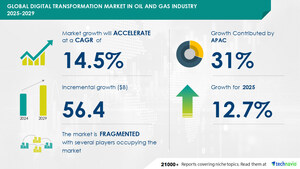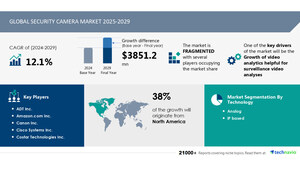NEW YORK, Nov. 15, 2024 /PRNewswire/ -- Report with the AI impact on market trends - The global industrial sensors market size is estimated to grow by USD 14.3 billion from 2024-2028, according to Technavio. The market is estimated to grow at a CAGR of over 9.44% during the forecast period. Rise in demand for smart factories and IIOT is driving market growth, with a trend towards increasing demand for sensors for remote monitoring. However, growing challenges in delivering high quality at low cost poses a challenge.Key market players include Amkor Technology Inc., Amphenol Advanced Sensors, Analog Devices Inc., Broadcom Inc., Excelitas Technologies Corp., Hamamatsu Photonics KK, Honeywell International Inc., Itron Inc., Maxim Integrated Products Inc., Motion Solutions, Murata Manufacturing Co. Ltd., NXP Semiconductors NV, Renesas Electronics Corp., Robert Bosch GmbH, Rockwell Automation Inc., ROHM Co. Ltd., Sensata Technologies Inc., Siemens AG, STMicroelectronics International N.V., TDK Corp., TE Connectivity Ltd., and Texas Instruments Inc..
Key insights into market evolution with AI-powered analysis. Explore trends, segmentation, and growth drivers- View Free Sample PDF
Industrial Sensors Market Scope |
|
Report Coverage |
Details |
Base year |
2023 |
Historic period |
2018 - 2022 |
Forecast period |
2024-2028 |
Growth momentum & CAGR |
Accelerate at a CAGR of 9.44% |
Market growth 2024-2028 |
USD 14.3 billion |
Market structure |
Fragmented |
YoY growth 2022-2023 (%) |
8.37 |
Regional analysis |
APAC, Europe, North America, Middle East and Africa, and South America |
Performing market contribution |
APAC at 38% |
Key countries |
US, China, Japan, Germany, and France |
Key companies profiled |
Amkor Technology Inc., Amphenol Advanced Sensors, Analog Devices Inc., Broadcom Inc., Excelitas Technologies Corp., Hamamatsu Photonics KK, Honeywell International Inc., Itron Inc., Maxim Integrated Products Inc., Motion Solutions, Murata Manufacturing Co. Ltd., NXP Semiconductors NV, Renesas Electronics Corp., Robert Bosch GmbH, Rockwell Automation Inc., ROHM Co. Ltd., Sensata Technologies Inc., Siemens AG, STMicroelectronics International N.V., TDK Corp., TE Connectivity Ltd., and Texas Instruments Inc. |
Market Driver
The Industrial Sensors market is experiencing significant growth due to the trend towards automation and real-time data in various industries. The Internet of Things (IoT) is driving the demand for sensors in areas like factory automation, infrastructure development, and smart cities. Transparency and efficiency are key benefits, leading to profitability and predictive maintenance through machine learning algorithms. Sensors play a crucial role in monitoring operational equipment, ensuring machine uptime and optimizing industrial processes. Level sensors, pressure sensors, and temperature sensors are common types used for process and quality control. Legacy machinery integration is also a focus, with companies like Asystom and Platinum providing solutions. IoT-enabled sensors offer wireless connectivity and automated machinery for remote monitoring and control. Companies like Viezo, Hiber BV, and Omron Automation provide wireless autonomous sensors and advanced software for real-time data collection. Industries like renewable energy, manufacturing, and logistics are investing in cost-effective facilities and smart sensors for material sorting, inventory counting, and root error detection. Sensing technology is essential for industries dealing with raw materials, such as powders, liquids, and gases, ensuring product quality and preventing facility stoppages and slowdowns. Advanced automation systems using sensors enable real-time pictures for quality inspection and monitoring capabilities for robotics applications. Infrastructure development in industrial communities relies on sensors for liquid pressure measurement, monitoring vacuum pumps, and detecting gas leakages. Overall, the Industrial Sensors market is a vital component of digital technologies and connected devices, driving productivity and efficiency in various industries.
The industrial sensors market is experiencing significant growth due to the increasing demand for advanced technologies in the oil and gas industry. Unconventional resources pose unique challenges, necessitating new sensors, processes, and analytics. Traditional systems lacked the ability to seamlessly integrate and operate field-to-cloud systems, particularly in large installations. However, the emergence of the Industrial Internet of Things (IIoT) presents a major opportunity for technological advancements. Global companies are upgrading their infrastructure to leverage IIoT's open, high-bandwidth protocols and cost-effective, intelligent networks. This transformation will enhance connectivity, monitoring, and process automation in industrial applications.
Request Sample of our comprehensive report now to stay ahead in the AI-driven market evolution!
Market Challenges
- The Industrial Sensors Market is experiencing significant growth due to the increasing demand for real-time data, transparency, efficiency, and profitability in various industries. The Internet of Things (IoT) is playing a major role in this trend, enabling predictive maintenance through machine learning algorithms and automated machinery. Sensors are crucial for condition monitoring in industries such as manufacturing, renewable energy, and smart cities. Challenges include integrating legacy machinery, ensuring infrastructure development, and dealing with false detection. Sensors for level measurement, pressure, temperature, motion, and flow are in high demand. Companies like Asystom, Platinum, Viezo, Hiber BV, and Omron Automation are leading the way with innovative solutions. Industrial processes require advanced automation systems for machine uptime and productivity. Digital technologies, connected devices, and advanced software are transforming the factory floor, enabling cost-effective facilities and improved industrial communities. Sensors for raw materials, gas leakages, and liquid pressure measurement are essential for industrial process control. In conclusion, the Industrial Sensors Market is a dynamic and evolving landscape, driven by the need for efficiency, profitability, and real-time data. Companies that can provide cost-effective, reliable, and innovative sensing technology will be at the forefront of this market.
- Industrial sensors play a crucial role in automating manufacturing processes and ensuring accurate and reliable data collection in various industries. Engineers and system developers are constantly seeking advanced sensors to expand their product offerings, as industrial automation continues to grow. However, the cost of customized sensors can be a significant barrier for many end-users. While off-the-shelf sensors have become more affordable, those tailored for specific applications in industrial process control remain more expensive due to their advanced technology. Vendors must balance affordability with customization to meet the demands of their clients and remain competitive in the market.
Discover how AI is revolutionizing market trends- Get your access now!
Segment Overview
This industrial sensors market report extensively covers market segmentation by
- End-user
- 1.1 Process industries
- 1.2 Discrete industries
- Product
- 2.1 Pressure
- 2.2 Temperature
- 2.3 Proximity
- 2.4 Flow
- 2.5 Others
- Geography
- 3.1 APAC
- 3.2 Europe
- 3.3 North America
- 3.4 Middle East and Africa
- 3.5 South America
1.1 Process industries- Industrial sensors play a crucial role in various process industries, including oil and gas, food and beverage, pharmaceuticals and healthcare, and water and wastewater treatment. In the oil and gas sector, industrial sensors facilitate the management of supply chain, production, and quality control, while ensuring minimal environmental impact. The food and beverage industry is witnessing a trend towards automation, with industrial sensors being used for efficient shelf and inventory management, and advanced image recognition for detecting missing or misplaced items. In the pharmaceuticals and healthcare sectors, the focus is on capitalizing on opportunities in research and development, leading to increased investment in industrial sensors for high-throughput optimization and regulatory compliance. The water and wastewater treatment industry is experiencing significant growth due to the increasing demand for potable water and the need for energy-efficient processes. Industrial sensors are essential in this industry for desalination, water reuse, and recycling applications. The power industry is also adopting industrial sensors on a large scale, particularly in smart grid applications for power monitoring, demand-side energy management, and coordination of distributed storage. These industries collectively contribute to the growth of the global industrial sensors market during the forecast period.
Download a Sample of our comprehensive report today to discover how AI-driven innovations are reshaping competitive dynamics
Research Analysis
The Industrial Sensors Market is experiencing significant growth due to the integration of the Internet of Things (IoT) technology, enabling real-time data collection and analysis. This transparency leads to increased efficiency and profitability for industries by enabling predictive maintenance through machine learning algorithms and automated machinery. Condition monitoring sensors, including level sensors, pressure sensors, and image sensors, play a crucial role in optimizing industrial processes. Companies are investing in advanced sensing technology such as Platinum sensors, CMOS image sensors, and IPX8 sensors to enhance operational equipment performance and ensure machine uptime. Semiconductor companies are at the forefront of this trend, providing cost-effective facilities for industrial communities. The E2EW Series, for example, offers a comprehensive solution for data collection and analysis, making it an essential tool for industrial automation.
Market Research Overview
The Industrial Sensors market is experiencing significant growth due to the increasing adoption of Internet of Things (IoT) technology and the demand for real-time data in various industries. Transparency, efficiency, profitability, and predictive maintenance are key drivers for this market. Industrial sensors play a crucial role in various applications such as condition monitoring, level sensors, process control, and quality control. Infrastructure development in sectors like smart cities, renewable energy, and legacy machinery is also fueling the demand for advanced sensing technology. Sensors used in industrial applications include pressure sensors, temperature sensors, motion sensors, flow sensors, and proximity sensors. These sensors are integrated with machine learning algorithms and automated machinery to enable predictive maintenance and improve machine uptime. The use of wireless autonomous sensors and HiberHilo's long-range wireless sensors is increasing in industrial automation and factory automation. The sensor market is expanding to include advanced automation systems, digital technologies, and connected devices. Industrial processes such as mixed-metal production lines, material sorting, inventory counting, and quality inspection are being optimized through the use of smart sensors and remote sensing capabilities. Real-time pictures and temperature monitoring are essential for quality inspection, while flow sensors help measure the quantity and flow rate of moving liquids and gases. The Industrial Sensors market is expected to continue growing as industries seek to improve machine performance, reduce facility stoppages, and minimize false detection. The use of sensors in industrial processes is essential for optimizing raw materials and improving overall productivity. The integration of advanced software and robotics applications is also driving innovation in the sensor market.
Table of Contents:
1 Executive Summary
2 Market Landscape
3 Market Sizing
4 Historic Market Size
5 Five Forces Analysis
6 Market Segmentation
- End-user
- Process Industries
- Discrete Industries
- Product
- Pressure
- Temperature
- Proximity
- Flow
- Others
- Geography
- APAC
- Europe
- North America
- Middle East And Africa
- South America
7 Customer Landscape
8 Geographic Landscape
9 Drivers, Challenges, and Trends
10 Company Landscape
11 Company Analysis
12 Appendix
About Technavio
Technavio is a leading global technology research and advisory company. Their research and analysis focuses on emerging market trends and provides actionable insights to help businesses identify market opportunities and develop effective strategies to optimize their market positions.
With over 500 specialized analysts, Technavio's report library consists of more than 17,000 reports and counting, covering 800 technologies, spanning across 50 countries. Their client base consists of enterprises of all sizes, including more than 100 Fortune 500 companies. This growing client base relies on Technavio's comprehensive coverage, extensive research, and actionable market insights to identify opportunities in existing and potential markets and assess their competitive positions within changing market scenarios.
Contacts
Technavio Research
Jesse Maida
Media & Marketing Executive
US: +1 844 364 1100
UK: +44 203 893 3200
Email: [email protected]
Website: www.technavio.com/
SOURCE Technavio

WANT YOUR COMPANY'S NEWS FEATURED ON PRNEWSWIRE.COM?
Newsrooms &
Influencers
Digital Media
Outlets
Journalists
Opted In




Share this article